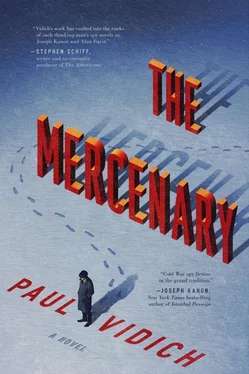Garin looked up from the page. Then he added a final sentence: He occasionally uses French words, which I assume he picked up when he was stationed in Belgium.
He set aside his report to Mueller and opened his spiral notebook. He had begun to record his activities. His notes were brief, often no more than reminders, and he made little effort to expunge names or references that could compromise his work if the diary fell into the wrong hands. It was a way of talking to himself. He wrote down concerns and opinions that he was not comfortable sharing with Mueller: What I disliked about John was his obviously colored hair with the gray roots clearly visible. There is something annoyingly vain about a middle-aged man unwilling to accept his age. I don’t trust him.
Then he added another random thought: The child will complicate things. He underlined the passage. He knew that it was always the human element that was hardest to predict and most difficult to accommodate. A spy took terrible risks, but a spy with a family was a different challenge. Garin needed to better understand Petrov’s character—his fears, needs, moods, and family loyalty—in order to unlock his complex psychology. Petrov was managing a three-dimensional world, lying to Garin in ways that Garin didn’t yet know, lying to his wife certainly, and possibly lying to himself. Garin knew that a traitor lived under tremendous pressure and if he wasn’t handled properly, he had the potential to spontaneously combust.
He’s on the fence , Garin wrote. Let’s see if he goes through with this .
He dated the entry. There were ninety-five days until Border Guard Day.
Garin woke at dawn and composed a report for Rositske on his Remington manual typewriter. He had an obligation to keep Rositske informed, and it was that requirement that helped him communicate with a man he preferred to keep in the dark. He knew that the report would be encrypted and sent to Langley, and eventually Mueller would read it. He didn’t write anything that contradicted what he said in his handwritten note, but he added answers to questions he knew would be on senior minds at Headquarters. The report would go to the head of the SE Division, the DCI, and, if Mueller was correct, the Oval Office, where the president had taken an interest in GAMBIT.
He claims he has access to top secret documents held in a classified library used by Sergei Churgin in his role as deputy chairman of the Committee for State Security , Garin wrote. Churgin is a front-runner to head up the KGB if his boss succeeds Chernenko as chairman of the Presidium. He is testing his power by having different institutes send him reports on their military technology research. Information comes into the classified library from places around Moscow, including the Scientific Research Institute of Radio Engineering. GAMBIT has exploited a gaping hole in the security system. He can sign out documents so long as he returns them by 6 P.M. Backpacks, attaché cases, bags, coats, and jackets are searched when officers leave the building at night so he works inside. He copies documents during the day, and at night he photographs the documents in a small closet near his office.
It gave Garin a sense of power to think of his readers, and like a good actor who played to his audience, he exaggerated where necessary. He has seen schematics of stealth aircraft designs with details on speed, radio frequencies, weapons capabilities, avionics, and look-down radar systems. Desk bureaucrats who demanded unreasonable quantities of intelligence had always rankled Garin, and when he reread his report, he underlined the last three words.
Garin thought intelligence bureaucrats were a special class of coward, eager to claim credit for successful missions they had little to do with and quick to flee from catastrophes that stemmed from their failure to understand how much could be asked of men in the field.
He is under a lot pressure, Garin wrote. He can only be pushed so far.
Then he made his demand of Rositske—an aggressive request, more than he needed, but this was the time to ask. Soviet identity documents and passports for GAMBIT, his wife, and his child. Perfect forgeries were needed with the names GAMBIT had provided. Plane tickets—two sets, one for the Finnish border and another for Uzhgorod. Safe passage at the border needed to be arranged. Garin would do what he had failed to do for Zyuganov. And money. He considered Petrov’s demand. It was a reasonable sum, in light of the intelligence he was providing and the risks he was taking.
GARIN FOUND PETROV AT THE plywood table, sitting in the dim winter light that came through the administrative office’s one dirty window. He had an open bottle of vodka and a half-empty glass. Their eyes met, and Garin knew something was on Petrov’s mind.
“I’m sure you have an excuse for being late. Spare me your lies.” Petrov pushed a glass across the table. “The idiots forgot the zakuski . I told them they’d have hell to pay if I didn’t get laid because my drama queen girlfriend refused to warm up without eating first.”
Petrov made a generous pour in Garin’s glass. “Were the photographs good?”
“Yes. We had them looked at. They are what we had hoped they would be.”
Ten days had passed since their first meeting. Contact between them had settled into a sort of routine. Garin avoided the neighborhoods he’d walked during his previous Moscow life, and he altered his route to the postal box. He’d entered the apartment lobby after seeing a single vertical chalk mark on the postal box by the tobacco kiosk, and he had retrieved the exposed film from the envelope wedged behind the steam radiator. Garin added a horizontal chalk mark to indicate he’d left a package. His envelope held ginseng root, and then a week later, he’d left a month’s supply of clonazepam tablets for the boy’s seizures. He also filled Petrov’s wife’s requests: a portable CD player, jazz recordings, and ABBA’s last album. And then Garin had seen two underscored vertical chalk marks—Petrov’s signal that it was urgent they meet.
“Then you have competent experts,” Petrov said. “Weapons of mass destruction have an obvious appeal.”
“How much more is there?”
“A lot. The rest I will bring with me when we cross the border.” He slowly placed his glass on the table. “Maybe I trust you, but I don’t trust the deskmen in Langley.”
Garin felt the man’s agitated mood, so he let Petrov do the talking. He saw that he’d been drinking while waiting. One-fifth of the bottle was gone.
“And this too bothers me,” Petrov growled. His eyes suddenly locked on Garin. “Traitors live in the ninth circle of hell. Traitors are below rapists, below child molesters. I see worry in your eyes, and the way you treat me with condescension to keep me happy and get me to talk. Shithead . What do you think? You think it’s easy?”
“What’s on your mind?”
“Question for question. You wouldn’t be so calm if you were sitting in my chair.” He glared. “I don’t even know your name, but here I am, confessing my sins.” Petrov’s eyes had drifted off but came back. “Traitor to what? State? Conscience? Family?” His smile was indignant. “Don’t worry, I’m not backing out. You’ve got my name. There is a point beyond which there is no return, and as much as your friends in Langley need me, I know I’m expendable if things don’t go as they want.” He leaned back, and his expression became wiser. “Point of no return. Familiar? I wouldn’t know to quote it, but in the days of samizdat, Kafka was popular, and someone I know gave me his journals as a joke. Well, now the joke is on me.”
Читать дальше












